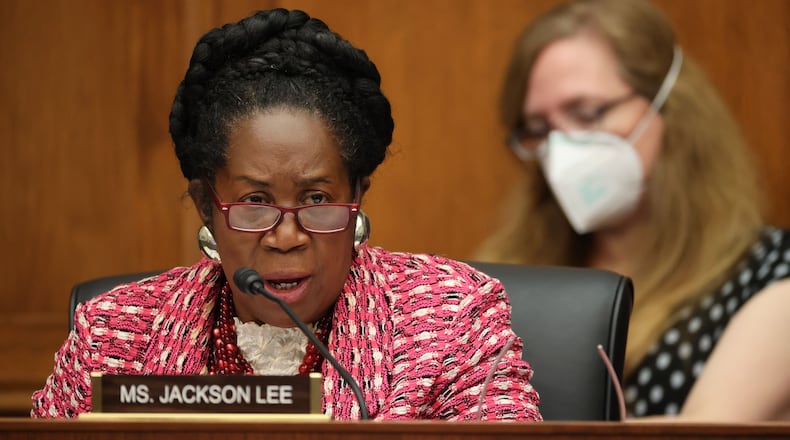In the midst of Black History Month, a group of Congress members is hoping, after multiple tries, to push a bill through that would create a committee tasked with considering reparations for the nation’s millions of descendants of slaves.
The phrase “40 acres and a mule” has resonated for Black people since the first days of life post-slavery, but the concept, despite being posed as legislation multiple times for at least the last three decades, has failed to become a reality for some Black Americans who have waited more than 155 years for such a repayment.
What began as a promise made to freed slaves in 1865 has become a centuries-long pursuit. Rep. Sheila Jackson Lee, D-Texas, wants to turn pursuit into promise with the H.R. 40 bill, which aims at creating a committee tasked with quantifying the government’s role in supporting the institution of slavery, various forms of discrimination against freed slaves and, ultimately, the lingering effects of slavery on living Black people.
The House Judiciary Committee met to receive testimony for and against the formation of the committee Wednesday, which invited commentary from conservative talk show host Larry Elder, former NFL player Herschel Walker, Rep. Cori Bush (D-Missouri), California Secretary of State Shirley Weber and several others.
Wednesday’s open discussion of the bill proved that even after decades of efforts to move legislation, the topic of reparations remains debatable.
Walker, a Black Republican, presented his challenges with forming a committee on reparations during the hourslong meeting Wednesday. Walker said white people living now should not have to atone for the actions of their ancestors. He also questioned how blackness would be measured if such a bill were passed and the economics of such a repayment to millions of slave descendants.
“My religion teaches togetherness. Reparations teaches separation,” he said in his testimony. “Slavery ended over 130 years ago. How can a father ask his son to do prison time for a crime he committed?”
Jackson Lee and other advocates of the bill look at it as the primary pathway to making amends for the Black population, which has spent generations enduring Jim Crow laws, unfair housing laws and other forms of economic and social inequities that can be aided, if not repaired, with reparations.
“Reparations for slavery is about reckoning with the institution itself which we haven’t fully documented and accounted for, but very much about the present day and how most of our inequities today are connected to the legacy of slavery when thinking about how racism has harmed the Black community,” Dreisen Heath, a program advocate at Human Rights Watch, said during her testimony at Wednesday’s hearing.
Debates about whether reparations are necessary for Black people and how to make it feasible abound, but ultimately the overarching question lingers today as it did 155 years ago: Will America repay Black people for enduring slavery?
Here is the history of reparations for Black people during the last century and why the concept continues to conjure discourse:
40 acres and a mule: A brief history
During Reconstruction, historians believe reparations were introduced as compensation for unpaid labor work during slavery. On Jan. 16, 1865, Gen. William T. Sherman issued Special Field Order Number 15, which set aside a 30-mile tract of land along the South Carolina and Georgia coasts for former slaves and promised the Army’s help securing loaned mules.
That order was necessary considering the 4 million slaves who were freed after the Civil War were left with no money, little education and no land. To carry out that order, the Freedmen’s Bureau was authorized to divide abandoned and confiscated land into 40-acre tracts for rental and eventual sale to refugees and former slaves.
Despite the efforts during this period, the land redistribution measures were ultimately abandoned. President Andrew Johnson vetoed the legislation, according to the Constitutional Rights Foundation. Most of that Southern land returned to white owners, who allowed former slaves to sharecrop for pennies on the dollar.
The next push for reparations for Black people came at the turn of the century, with several Black organizations lobbying Congress to provide pensions for former slaves and their children. One bill introduced in the Senate in 1894 would have granted direct payments of up to $500 to all ex-slaves plus monthly pensions ranging from $4 to $15. That, and other similar bills, never made it past congressional committees. The pension movement itself faded with the onset of World War I.
Unfinished business
As W. E. B. Du Bois wrote in 1935: “the slave went free; stood a brief moment in the sun; then moved back again toward slavery.”
Du Bois' sentiment rang true for many Black people across the country, especially those living in the Jim Crow South. By the 1960s, Black organizers rallied for equal rights via the civil rights movement and brought reparations back into the forefront. In 1969, James Forman, then head of the Student Non-Violent Coordinating Committee, proclaimed a “Black Manifesto.” That call to action demanded $500 million from American churches and synagogues for their role in supporting slavery before the Civil War. Black nationalist organizations, such as the Black Panther Party, also supported the idea of repayment, but the calls fell on deaf ears.
The debate and pursuit continue
Rep. John Conyers fought for reparations until his death. He presented a bill every year from 1989 until 2017 to review reparations for Black people.
In 2019, the year Conyers passed away, legislators picked up where he left off. Jackson Lee reintroduced the bill that year, adding recommendations that “apology and compensation” would go along with the study.
“This is a nation that has gone through slavery, Reconstruction, lynching, Jim Crowism,” Jackson Lee told The New York Times in June. “We’re in a new era. We have the hearts and minds of the American people. That’s why I think reparations will pass.”
Ta-Nehisi Coates’ article, “The Case for Reparations,” from the June 2014 issue of The Atlantic, helped galvanize a national reawakening to the necessity of reparations and continued effects of slavery. He talked to several people who were met at the demarcation line between wealth and poverty with redlining, low-paying jobs, subpar education and predatory home loans.
Though Coates interviewed individuals born in the early 1900s, their plight still presented itself in statistics for Black people today. The latest U.S. Census Bureau data reveal the median net worth for the typical white family is $171,000, while the net worth for the typical Black family is $17,150.
Closing that wealth gap will take trillions of dollars, which is why some have argued that it is impossible to provide restitution. Some have pointed to government social programs such as welfare, subsidized housing, health care, employment development, affirmative action and education as ways Black Americans were aided.
Senate Minority Leader Mitch McConnell has said he disapproves of paying reparations for slavery because “none of us currently living are responsible” for what he and many have called America’s original sin.
“We’ve tried to deal with our original sin of slavery by fighting a Civil War, by passing landmark civil rights legislation. We elected an African American president,” the Kentucky Republican told reporters in a 2019 news conference.
Most Americans agree with him. A June 2020 Washington Post/ABC poll found that 63% of Americans do not agree with Black Americans receiving reparations. The minority view has become more prevalent with focus now on racial equality in the aftermath of the deaths of George Floyd, Breonna Taylor and others.
Black Democrats have long expressed support for restitution for slavery, but the 2020 election brought about more support from white leaders, including then-presidential candidate Joe Biden. On Wednesday, his White House press secretary Jen Psaki was asked where the president stood on the current consideration of the bill.
“It’s working its way through Congress,” Psaki told reporters when asked if Biden would sign the bill should it pass. “We’d certainly support a study, but we’ll see what happens through the legislative process.”
Though the bill currently has 162 co-sponsors, Jackson Lee and those in support of the plan face mounting criticism that the committee would propose actions that would be “impractical,” Rep. Burgess Owens (R-Ohio) said during the hearing. He flatly stated “it is impractical and a nonstarter for the United States government to pay reparations.”
“... Our nation has elected a Black American as president and Black female as vice president. It’s called progress,” Owens said, referring to former President Barack Obama and Vice President Kamala Harris.
Jackson Lee acknowledged that success of Black people in her response to Owens. Toward the end of the more than three-hour hearing, the Texas representative showed an image of a slave, Gordon, who was beaten and eventually escaped. She explained that the image of the freed slave with brutal bruises on his back is representative of the ongoing “sting” Black Americans feel.
“We’re hidden in the corners of this nation, of those of African-American heritage, the descendants of enslaved Africans who have felt the sting of disparities. They continue to feel that sting,” Jackson Lee said.
The legislators have until next week to submit any additional questions to the panel before it is submitted to Congress.
About the Author
Keep Reading
The Latest
Featured



